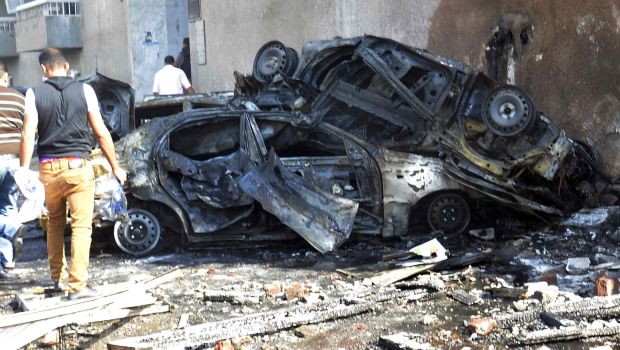
Egyptian security personnel and residents check the site of an explosion in Ismailia, around 120km (75 miles) east of Cairo, October 19, 2013. (REUTERS/Stringer)
Kamal Habib, an expert on jihadist groups, told Asharq Al-Awsat that Salafi jihadists had widened the scope of their activities in Egypt’s Sinai peninsula to include cities on the Suez Canal, which presented a threat to the waterway, especially since some had previously attempted to attack ships in the canal.
An official of the Canal Authority, however, replying to questions by Asharq Al-Awsat, stressed that the explosion in Ismailia on Saturday had no effect on navigation in the canal. He added that the explosion only affected one of the residential buildings belonging to the authority, which was close to the intelligence HQ.
Following the Ismailia attack, widely-held to be the work of Islamist extremists, Habib said the Salafi jihadist movement had begun to widen the geographic area of its operations after initially focusing on the Sinai, to stretch from Ismailia to Rafah, on the border between Egypt and the Gaza Strip.
He said “the Suez Canal was one of the targets identified by the extremists and Al-Qaeda organization, and could be a possible arena for these groups’ operations.”
Meanwhile, Egypt’s army and police say they have confiscated thousands of weapons smuggled into the country from Libya. Army sources said the armed forces confiscated arms caches which included explosives and missiles in the last few months.
Security sources also say they have uncovered plans to smuggle arms, including advanced American weapons, from Libya to Gaza. The closure of the smuggling tunnels between Egypt and Gaza had led to the accumulation of weapons in Sinai, which fell in the hands of extremists.
Habib added that most of these arms were found around the area of Ismailia and further east, and they include advanced weapons.
Egyptian sources estimate the number of extremists in Sinai to be between 3,000 and 10,000, although these numbers had declined due to the army strikes following an increase in violence which followed the ouster of former president Mohamed Mursi.
Meanwhile, Hassan Khalaf, a veteran who fought against the occupation in Sinai, told Asharq Al-Awsat that the influence of takfirists who targeted security and military buildings in recent months was in decline.
He said “these takfirists have become paralyzed, and I think their infrastructure has been heavily damaged.” He described the car bomb attack on Saturday as a “desperate operation,” and that “I expect Sinai will be under control within six months, and I expect that these operations would decline with the passage of time.”
